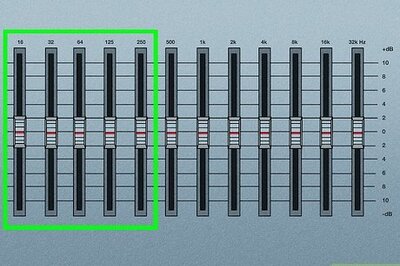
views
Maintaining Your Health Goals

Weigh yourself regularly. There are a variety of ways to maintain a lean physique. However, self-weighing on a regular basis is one of the most important. Many studies have shown that getting on the scale at least once a week is important for weight maintenance long-term. Those who were more regular with weigh-ins had an easier time maintaining their weight and could maintain it long-term. When you get on the scale each week, try to weigh yourself at the same time of day and in the same clothes. It'll give you a more accurate representation of any trends. Give yourself a weight range to stick to. It's not realistic to think you'll be the exact same weight every day or every week. It's normal to fluctuate up or down 3-5 pounds. Track your weight in a journal. If your weight goes up too high or too low, you'll know you need to make changes to your diet or exercise plan to correct those unwanted changes.

Take measurements monthly. Another way to maintain your physique and to keep yourself at your goal is to take regular measurements. Common areas to measure and track are waist, hips, thighs, and arms. Keep these measurements in a journal and track them over time. Like regular weigh-ins, taking measurements on a regular basis can let you know if you're staying at a stable weight and level of muscle mass. You won't see many noticeable differences in measurements in just a few days or even a week. Give yourself about a month's time to notice any significant changes. If you're aiming to maintain or even continue to increase muscle mass or decrease body fat, you should see changes in those numbers. If you notice any unwanted to changes to these numbers, take a look at your diet and exercise and make changes to those areas if needed.

Keep a journal. Even when you're maintaining your goals, keeping a journal can be helpful for maintenance. You can use your journal to keep notes of a variety of things. It's a good idea to track your food, average calorie intake, exercise, and measurements. If you notice any changes in weight, measurements or overall fitness level, you can return to your journal to see if you've slowly slipped away from your maintenance exercise or diet plan. Journaling can also help keep you accountable over time. It might be easier when you're maintaining your weight, but it's still a good idea for long-term accountability.

Define new goals. Although you may have met some of your initial goals regarding weight or physical activity, you might want to consider making additional goals to help keep you motivated to maintain your physique. Additional goals could be a variety of things. You may want to continue losing weight or improve your fitness levels. You may also set goals to keep pushing yourself. For example, you might want to sign up for a 1/2 marathon or a mini-triathlon. These loftier goals can help keep you motivated and working hard physically.
Supporting Your Physique with Diet

Become calorie aware. You still need to watch out for how many calories you take in and expend every day. If you want to maintain weight, you need to aim for a number of calories that equals how much your body expends during the day and what you burn off during exercise. There are a variety of online calculators that can give you a pretty accurate estimate of how many calories you need daily to maintain your weight. However in general, women should consume about 2,000 calories to maintain weight and men should consume 2,600. Note that this amount may vary from person to person based on genetics, activity level, age, and weight. After you get an idea of your goal for the day, start tracking your calories over time and your weight. If you see weight loss or weight gain, adjust your calorie intake as needed so you begin to maintain your weight. You may want to consider continuously monitoring calories and your overall food intake just to keep track. Overtime if you see any undesired changes, you can refer back to your calorie and food journal to see what caused these changes. Plan your week to compensate. If you have a big dinner and drinks with friends on Wednesday, you might want to compensate by consuming fewer calories on Tuesday or Thursday.

Eat adequate amounts of protein. Protein is not only essential to weight loss but even more essential for weight maintenance (especially if you're maintaining more lean muscle mass). Stick to a high protein diet to help maintain your physique. Many studies have shown that a high protein diet helps sustain weight loss and helps maintain weight better than a lower calorie diet. A high protein diet means that you'll need to consume at least 1 serving of lean protein at every meal, in addition to including 1-2 high protein snacks throughout the day. Leaner proteins are lower in calories and will make it easier to stay within a certain calorie level. Measure out a 3-4 oz serving of protein for each meal and include 1-2 oz for snacks. Choose a variety of both lean protein and those containing healthy fats. Try poultry, beef, eggs, dairy, legumes, tofu, seafood and pork.

Choose the right type of carbohydrates. Weight maintenance or maintaining a specific physique will require you to eat the right type of carbohydrates. What carbs and how much you need will depend on your goals. Studies have shown that if you want to maintain a leaner physique, that you follow a lower carb diet. This type of eating patterns make it easier to maintain your weight. In addition, a lower carb diet can help you maintain a lower body fat percentage and increased muscle mass. Carbohydrates are found in many foods including dairy products, fruits, starchy vegetables, legumes, and grains. Foods like starchy vegetables, legumes, and fruits offer your body a large variety of other nutrients like fiber, protein, vitamins, and minerals. Do not limit these nutritious foods due to their carbohydrate content. However, grains can be limited as many of their nutrients are found in other foods. If you choose to eat carbs, go for 100% whole grain and measure out a 1/2 cup or 1 oz portion total.

Include adequate amounts of vegetables. Regardless of what type of physique you're aiming to maintain or what weight you want to stay at, it's important to eat adequate amounts of vegetables every day. Vegetables are very low in calories but also high in fiber, vitamins, and minerals. They'll fit easily into your maintenance diet and provide you with the majority of your needed nutrients each day. Try to include vegetables at most meals and some snacks. Measure out 1 cup of denser vegetables and 2 cups of leafy salad greens.

Drink enough fluids. When you're trying to maintain a lean physique, you're most likely participating in some sort of physical activity. It's important to stay hydrated by drinking adequate amounts of fluid. Aim to drink a minimum of 8 glasses of water daily. However, when you're exercising frequently, you most likely need closer to 13 glasses of water daily. Note that not all fluids count as hydrating beverages. Only water, flavored water, decaf coffee and tea will hydrate your body. In addition, electrolyte drinks, coconut water or low-calorie sports drinks can replace electrolytes lost through your exercise and help hydrate you as well.
Keeping Up With Physical Activity
Continue with aerobic exercise. Regardless of what type of physique you have (big and muscular or lean and toned), continuing with aerobic exercise is essential to maintaining your weight, physique and overall fitness level. In general, it's recommended that you include at least 150 minutes of moderate intensity aerobic exercise each week. This is the minimum amount needed to generally maintain your weight and cardiovascular fitness. Depending on what goal you've reached, you may need to increase the amount of time of aerobic exercise you do or include higher intensity levels of exercise. For example, if part of your goal was to run a 1/2 marathon, then you may want to keep up this level of fitness by including longer runs during the week.

Choose the right type of weightlifting. If you've reached a lean physique, you've probably been doing some type of weight lifting or resistance training. Maintaining your physique will require you to continue this type of training. At a minimum include 1-2 days of strength training each week. Again, this is the minimum that's been set to maintain basic physical health. What type of physique you currently have and want to maintain will determine what type of strength training you want to do. There are exercises to help you build bulk and others that will build strength and definition. You should definitely keep up with weight training to maintain a lean physique. If you are hitting a plateau or your physique is slipping, however, you should change up your routine. Which exercises to do and how many reps to do of each exercise greatly depend on your fitness goals, your past experiences, your injuries, and your strengths. You can start learning about weight training here, and you can also see a personal trainer for a session or two to make a fitness plan. There are many different ways to change your weight training routine if yours isn't working. You can change the exercises you do; the speeds of your exercises (i.e. plyometrics vs. isometrics); your positioning (such as an underhand or overhand grip); your schemes for your number of sets, reps, and weights; and which programs you do on which days. You should also try different weight, rep, and set techniques, such as pyramiding, to keep your muscles challenged. In pyramiding sets, you start by doing few reps with more weight, more reps with less weight, and then few reps with more weight again (so, essentially, your number of reps is "pyramiding" from smallest to largest and then back down to smallest).

Plan for rest days. When you're working hard to be physically active and maintain a lean physique, it's important to take care of your body and take an adequate amount of rest days. Rest days are important for everyone at any fitness level. They allow your body to rest and recover from aerobic or anaerobic training. Rest days are especially important for your muscles. It's actually during rest that your body sees significant increases in strength or mass. It's typically recommended to include 1-2 rest days per week. Try to make your rest days active. Instead of staying home and doing no activity at all, participate in restorative, low intensity, and low impact exercises. You could do yoga or go for a walk or take a leisurely bike ride.




















Comments
0 comment